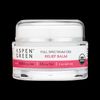Some over-the-counter (OTC) topical creams, like lidocaine or capsaicin, may be helpful for nerve pain.
Nerve pain is distinct from typical tissue pain. When you have tissue pain, like falling down or getting a cut, your nerves deliver the pain message to your brain.
But when the nerves themselves become irritated or damaged, they become the source of pain. This type of pain can be severe and more difficult to treat.
Nerve pain is typically treated with prescription-strength medications, but some over-the-counter products, primarily topical creams and ointments, can help take the edge off.
Nerve pain, or neuropathy, is when the nerves that carry information to and from the brain and spinal cord become damaged, leading to symptoms like
- pain
- numbness
- tingling
- weakness in the affected areas
Common conditions causing neuropathy include:
- metabolic disorders (diabetes)
- viral infections (herpes, HIV, leprosy)
- autoimmune disorders (multiple sclerosis and Guillain-Barre syndrome)
- chemotherapy-induced neuropathy
- stroke
- traumatic nerve damage (spinal cord injury or amputation)
- shingles
- blood vessel disease
- vascular malformation
Neuropathy is estimated to affect anywhere from
Nerve pain can be difficult to treat since it affects the nerve itself. This pain can be quite severe and debilitating, causing numbness, tingling, and stinging.
Typical over-the-counter (OTC) pain relievers, like acetaminophen (Tylenol) and ibuprofen (Advil), aren’t very effective for nerve pain, and most people will need prescription-strength medications.
Still, some OTC options are beneficial if your pain is mild, if you haven’t seen a doctor yet, or if it’s safely combined with prescription medications.
Lidocaine
Lidocaine is a local anesthetic that can be found in the form of creams, gels, sprays, or patches — both OTC and by prescription, depending on its strength. Lidocaine, along with other topical creams, can help treat nerve pain near the skin’s surface, a condition called peripheral neuropathy.
Lidocaine provides temporary relief by blocking the transmission of pain signals from the nerves to the brain. Topical lidocaine creams or patches can be applied directly to the affected area, and the numbing effect typically lasts for several hours.
Lidocaine may cause some numbness, tingling, or itchiness at the application site. But contact your doctor if you have one of these more severe side effects:
- changes in blood pressure leading to dizziness or lightheadedness
- nausea or vomiting
- severe headache
- allergic reactions
Capsaicin
Capsaicin is what makes chili peppers hot. Capsaicin is believed to ease chronic nerve pain by making your nerves insensitive to pain messages. Like lidocaine, capsaicin comes in several forms, including patches, creams, ointments, and gels.
Some evidence suggests that high-concentration (8%) capsaicin patches (available by prescription) can give at least moderate pain relief to a minority of people with postherpetic neuralgia (a complication of shingles).
There’s also little evidence that capsaicin may benefit people with HIV neuropathy and diabetic neuropathy.
Capsaicin cream can cause temporary redness, burning, or pain. Serious problems appear to be uncommon, even with highly concentrated doses.

Nervex Pain Relieving Cream

Salonpas Capsicum Patch
CBD
While CBD (cannabidiol) is considered more of a supplement than a medication, it’s worth mentioning because of its potential for relieving neuropathy and its wide availability in vitamin and drug stores.
CBD works by interacting with the body’s endocannabinoid system, which regulates pain, inflammation, and other bodily functions. Several forms of CBD can treat nerve pain, including topicals, capsules, oral tinctures, edibles, and inhalable products.
While there are numerous positive anecdotes of people using CBD for nerve pain, there’s not much scientific research on humans available, especially with CBD alone (without THC).
In a small 2020 study, 29 people with neuropathy were randomized to receive topical CBD oil or a placebo. After 4 weeks, the CBD group showed a statistically significant reduction in intense or sharp pain and cold and itchy sensations. No adverse side effects were seen in this study.
More research needs to be conducted on larger populations.
Overall, with its low potential for abuse, strong safety profile, and promising findings in animal studies, CBD is an attractive option for pain relief.
It’s important to note that CBD can interact with certain medications like blood thinners, heart medications, and immunosuppressants (medications given after organ transplantation).

CBDfx Muscle and Joint Cream, Cooling Formula

Aspen Green Relief Full Spectrum CBD Exfoliating Balm
Menthol
Menthol is a natural compound found in peppermint that’s commonly used in topical pain-relieving products like creams, gels, and sprays.
It works by producing a cooling sensation on the skin, which can help to distract the brain from the sensation of pain and provide temporary relief.
While there’s limited research on menthol for neuropathy, a 2015 study found that 1% topical menthol applied twice daily effectively reduced nerve pain.

Cornbread Hemp CBD Lotion, Menthol Formula

ReBotanicals Menthol Muscle Rub with CBD
Typical OTC oral medications and nonsteroidal anti-inflammatory drugs (NSAIDs) aren’t very effective for neuropathy.
Rather, medications like anticonvulsants, antidepressants, and opioids are often used to treat nerve pain. These medications work by targeting the nervous system and helping to reduce the perception of pain signals.
Based on research-based
- gabapentinoids — a subclass of anticonvulsants (gabapentin, pregabalin)
- tricyclic antidepressants (amitriptyline)
- selective-serotonin-norepinephrine reuptake inhibitors (duloxetine, venlafaxine)
Second-line treatments include:
- topical treatments (lidocaine, capsaicin)
- milder opioids (tramadol)
Third-line treatments include:
If your nerve pain is chronic or severe, you’ll likely need prescription-strength medications because common OTC medications, like ibuprofen, aspirin, and acetaminophen aren’t very effective for nerve pain.
Still, certain OTC topical options, like capsaicin or lidocaine cream, may be helpful if your pain is mild or if you use them along with prescription medications.
It’s important to speak with a healthcare professional to determine the underlying cause of your pain and the best treatment option for you.

